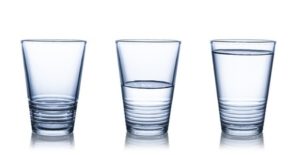
Water was the hands-down winner when nutrition experts collaborated to determine which beverage provides the greatest health benefits. The six U.S. researchers of the Independent Beverage Guidance Panel ranked beverages into six levels based on calories, energy and nutrients, and evidence for positive and negative effects on health.
An overview of the results, published on Harvard’s School of Public Health website, names water’s major contenders for health benefits and highlights important nutritional tidbits, including the fact that not everyone needs to drink eight glasses of water a day.
Level 1: Water
This should be your primary go-to for rehydrating your body to restore fluids lost through burning calories, breathing, sweating, and removal of waste. A number of factors help define each individual’s hydration needs: quantity of food eaten, weather and activity level.
Most people will get 80 percent of their water by drinking it and the remainder by eating it. Water-rich fruits include watermelon, cucumber, grapefruit, cantaloupe, strawberry and peaches. Vegetables include radishes, zucchini, celery, lettuce and cauliflower.
Level 2: Tea and coffee
These two beverages, when consumed plain, are devoid of calories and include many healthy substances, including flavonoids, which have antioxidant, anti-inflammatory and antiviral properties.
Additives like cream, sugar and whipped cream turn these into unhealthy choices. Research indicates that daily intake of up to three or four cups of these caffeinated drinks is the sweet spot. According to eatright.org, studies show drinking black tea is associated with a decreased likelihood of heart attack while green tea is related to lower bad cholesterol and higher good cholesterol.
Level 3: Low-fat milk, skim milk and soy beverages
Milk is a good source of calcium and vitamin D, but the Panel stresses choosing low-fat or fat-free milk, which have less saturated fat than whole milk. Even low-fat milk has a lot of calories so it’s wise to drink no more than two glasses a day. Soy milk is a good option if you are lactose intolerant or don’t like milk.
Level 4: Calorie-free sweetened beverages
Diet drinks are sweetened with calorie-free artificial sweeteners. But because there is an ongoing debate over whether or not these sweeteners contribute to weight gain, it is best to limit your intake to an occasional treat.
Level 5: Beverages with calories and limited nutrients
This category includes fruit juice, vegetable juice, sports drinks, vitamin waters and alcoholic beverages. Due to a high caloric index, it’s best to limit fruit juice to a four-ounce serving per day. Since fruit smoothies are high in calories, they should only be an occasional treat. While most vegetable juice is a lower calorie option, it often has a large amount of salt. So read labels!
Sports drinks are only needed by athletes who exercise an hour or more straight and sweat a lot. Vitamin waters are redundant if you take a daily vitamin.
With regard to alcohol consumption, one study of 38,000 men over a 12-year period showed that moderate drinkers of wine, beer and spirits were 30-35 percent less likely to have a heart attack than non-drinkers. Those who drank daily were at less risk than those who drank once or twice a week.
Level 6: Sweetened beverages with calories
This is the least desirable category, according to the Panel. It includes beverages sweetened with sugar or high-fructose corn syrup, including soft drinks, fruit drinks, lemonade, fruit smoothies and many energy drinks. They are high in calories and have no nutritional value.
The take-away
The Panel concluded that we can get all of the fluid we need by simply drinking water and getting nutrients from food. But realizing we are human and not likely to follow a “water only” philosophy, they suggest the following guide for a healthy liquid consumption:
- It is not the total volume (ounces) of liquid consumed daily, but the proportion of each liquid that helps support our optimum health.
- Half of the fluid consumed each day should be water.
- One-third of daily liquid intake can be unsweetened coffee or tea.
- Low-fat milk can account for 20 percent, or two eight-ounce glasses, of liquid daily consumption. If you drink less than that, be sure to get your calcium from food or a supplement.
- No more than four ounces of 100 percent fruit juice.
- Limit daily alcohol consumption to two drinks if you’re a man, one drink if you’re a woman.
- Ideally, no drinks with artificial sweetener or any form of added sugar.
With an Iowa summer upon us, it’s especially important to remember to drink plenty of liquids and be sensible when exercising outdoors. Be aware that thirst often declines in older adults and drink to your health on a daily basis.